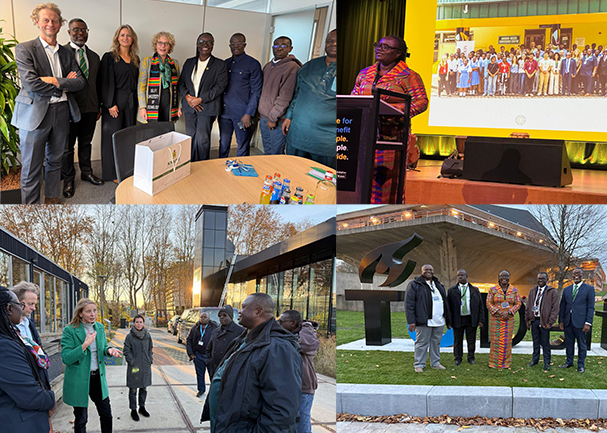The Vice-Chancellor of the Kwame Nkrumah University of Science and Technology (KNUST), Kumasi, Professor Mrs. Rita Akosua Dickson, has described the university’s decade-long collaboration with the Technical University of Delft (TU Delft) as “a marriage for life”, built on trust, shared purpose and a commitment to solving real-world problems.
Speaking at the 10th Anniversary Celebration of the TU Delft Global Initiative, Prof. Dickson said the partnership had evolved into a model of Global North–South collaboration where research outcomes translate into tangible, life-changing impact rather than remaining confined to laboratories.
The Vice-Chancellor led a high-powered KNUST delegation including the University Registrar, Mr. Benjamin Boampong Owusu; Finance Officer, Dr. Charles Nsiah; Dean of the International Programmes Office, Prof. Edmund Ekuadzi; and Prof. Samuel Akomea of the KNUST School of Business.
The three-day official visit featured technical meetings and facility tours, including TU Delft’s Green Village and the Process Engineering Department’s gasification laboratories. The delegation reviewed ongoing and emerging collaborations and saw first-hand how Delft’s innovations are deployed at scale.
One of the visit’s highlights came at YES! Delft, one of Europe’s leading incubator hubs.
Walking through spaces buzzing with innovation, where startups transform from bold ideas into thriving companies, the delegation witnessed a powerful model for nurturing entrepreneurship. Here, young founders receive not just office space but mentorship, access to networks, funding opportunities and the kind of supportive ecosystem that turns dreams into viable businesses.
“We’re seeing a roadmap for how universities can tackle graduate unemployment,” noted Prof. Samuel Akomea. “It is not only about creating jobs. It is about empowering our graduates to become entrepreneurs who solve real problems while building sustainable businesses.”
The visit sparked discussions on how KNUST and partner institutions could adapt similar models to African contexts, especially in ventures advancing the Sustainable Development Goals in areas such as clean energy, food security and sustainable urban systems.
Prof. Dickson said ten years of partnership had created “the kind of trust and friendship that can weather any storm”. She noted that the collaboration had delivered meaningful results in entrepreneurship, renewable energy and the circular carbon economy.
Discussions with TU Delft’s Pro Vice-Rector of International Affairs, Prof. Ir. (Mrs.) Ena Voute, explored new frontiers including electric vehicle technology and rail transport engineering.
“In Ghana, as in many parts of the world, energy is not just a commodity. It is dignity,” she told the audience. “It is a child being able to study after sunset. It is a community pharmacist keeping vaccines cold. It is a farmer processing crops before they spoil.”
She cited collaborative programmes such as AMBiTION and GROW as evidence of what can be achieved when joint research is driven by real community needs. Researchers including Prof. Sam Akomea, Prof. David Ato Quansah, Dr. Yen Adams and Prof. Hannah Vivian Osei were highlighted for their contributions.
Even while celebrating past successes, Prof. Dickson emphasised the need for a sharper, future-focused agenda.
“Let us be bold in our ambitions. Let us not only aim to publish. Let us aim to transform. The real measure of our success will not be how many papers we publish but how many lives we transform.”
She also underscored the importance of closer links between universities and industry and warned that “innovation that stays in the laboratory is a promise unfulfilled”. With five years left to achieve the Sustainable Development Goals, she highlighted the urgency imposed by climate change and socioeconomic pressures. “We are not just chasing abstract goals. We are racing against time.”
Her message closed on a hopeful note.
“Every energy solution we improve and every sustainable practice we scale up is an act of defiance against despair. It is proof that ingenuity guided by compassion can meet even the greatest challenges.”
Both institutions reaffirmed their commitment to deepening collaboration over the next decade, with expanded research, academic mobility and innovation programmes aligned with SDGs, particularly affordable clean energy, quality education and climate action.
“We are honoured to be part of your story,” Prof. Dickson told her hosts. “And we look forward to writing the next chapter, defined by deeper collaboration, greater innovation and shared success together.”

















